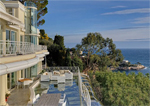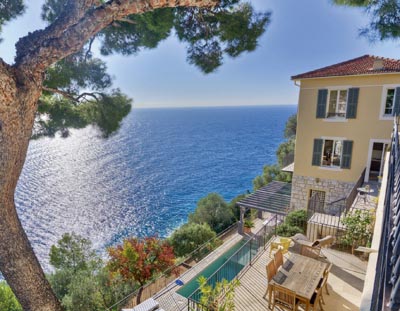How to buy property in France: Tax
Buying property in France can still be an attractive option – Country Life explains the new French tax laws


Last summer, some newspaper reports were keen to suggest that France's new tax laws would prove punitive for British owners of French holiday homes. The reality of François Hollande's plans-which, admittedly, were announced with much confusion-isn't nearly so alarming. Indeed, for many non-resident homeowners, the changes will make no difference whatsoever.
Non-resident Britons will now have to pay an extra 15.5% on rental income, to reflect the ‘social contribution' that the locals pay, thus increasing the effective total tax rate to 35.5%. However, it's important to note that this new, additional tax only applies to rental income on properties that are let unfurnished. British owners who use their holiday home purely for their own enjoyment will not be affected, nor will those who rent out their property furnished.
The French government reckons the tax will only apply to 60,000 of the 360,000 properties across France owned by non-residents. Even for those unlucky few, however, the impact is less than initially thought. The 15.5% charge was, at first, defined as a social contribution, and, as this was designed to pay for public services that non-residents don't actually use, it caused an outcry, so it's been redefined as a tax. This benefits British taxpayers who earn rental income from France because it ensures that, under the Double Tax Agreement with the UK, they don't have to pay Income Tax to both countries on the same money.
For example, a 40%-rate British taxpayer previously paid 20% of his French rental income to the UK Exchequer and 20% to the French government. Now, this taxpayer will pay 35.5% to the French government, leaving the UK Exchequer with only 4.5%. It's not the homeowner who's losing out, but George Osborne. The only Britons who will be genuinely worse off are the 22%-rate taxpayers letting out an unfurnished home in France, as they'll now pay an additional 13.5% of that income in tax.

The French government has also increased the Capital Gains Tax (CGT) rate, from 19% to 34.5%, on the net profit from selling a second home. However, there is tapered relief for those who have owned their property for between five and 30 years and after 30 years of ownership, no tax applies. The CGT exemption period used to be 15 years before France's previous presi-dent, Nicolas Sarkozy, increased it and there are rumours that M. Hollande plans to reduce it to 22 years. The government has also brought in a tax break for 2013 to encourage fluidity in the market.
There were fears that the market could stagnate due to the tax uncertainty, but, as Tim Swannie of Home Hunts explains: ‘The changes didn't seem to have any effect as far as we're concerned. We sold more properties in the last quarter of 2012 than in any other quarter that year and this year has also got off to a flying start.'
Nicholas Leach at Athena Advisors echoes this: ‘The Socialist government is continuing to implement pro-growth measures and clarify its initially confusing position on taxes. Combined with historic-ally low interest rates and the attractive French mortgages available, this is resulting in increased investor activity.'
Exquisite houses, the beauty of Nature, and how to get the most from your life, straight to your inbox.
However, Knight Frank's Matt Hodder-Williams says that worries and confusion about wealth tax changes have meant that, at least in the south-west of France, this increase in activity has been focused on property priced at under €1.3 million. M. Sarkozy had cut and simplified the wealth tax for 2012, but M. Hollande undid this reform, upped the rates, reintroduced many of the complications and backdated his changes to January 1, 2012.
Both the way in which the wealth tax is now calculated and what's included in it are rather arcane, but the essential point is that net assets that total up to €1.3 million incur no charge (against a €3,180 tax bill for net assets of €1.4 million, all the way up to a massive €15,670 for net assets of €3 million). For non-residents, the wealth tax is levied on a household's net assets in France, thus making lower-value properties more attractive.
To make an informed decision on whether to buy in France, however, people should take other factors into account, too-prices above all. Sale prices in the south-west of France, which is traditionally a popular area with British buyers, have dropped by 40% since 2007. But average advertised prices haven't dropped by the same figure. Some houses are realistically priced, but others are not, so buyers should study the market carefully to judge the true worth of a particular property.
Ringfencing equity is also important when making a purchase. The Economist publishes a quarterly survey that assesses whether property is comparatively cheap or expensive internationally. Its latest survey, of January 12, found that French property was overvalued by 35% (the highest of the 18 countries surveyed) in terms of price-to-disposable income ratios, and overvalued by 50% in terms of rental returns (beaten in this only by Hong Kong, Canada and Singapore). The figures for Britain are 12% and 21% respectively.
Despite this, French property is still seen as a good investment. ‘France has a proven, stable property market,' explains Mr Swannie. ‘Lending criteria have always been strict. For example, 100% mortgages have rarely been available and re-mortgage is almost a dirty word with French lenders, so France hasn't had the sub-prime lending problem experienced by many other countries. There are still good deals to be had, as many owners are motivated to sell and strong negotiations can be made on certain properties.'
‘Many sellers are ready to take a sensible attitude to offers,' agrees Stuart Baldock of property finders Hindle & Baldock. ‘If you want to buy in France, obtain a good feel for the market, so when you've found what you want, you'll be in position to negotiate the correct price.'
* Subscribe to Country Life and save
* Follow Country Life magazine on Twitter
Country Life is unlike any other magazine: the only glossy weekly on the newsstand and the only magazine that has been guest-edited by His Majesty The King not once, but twice. It is a celebration of modern rural life and all its diverse joys and pleasures — that was first published in Queen Victoria's Diamond Jubilee year. Our eclectic mixture of witty and informative content — from the most up-to-date property news and commentary and a coveted glimpse inside some of the UK's best houses and gardens, to gardening, the arts and interior design, written by experts in their field — still cannot be found in print or online, anywhere else.

